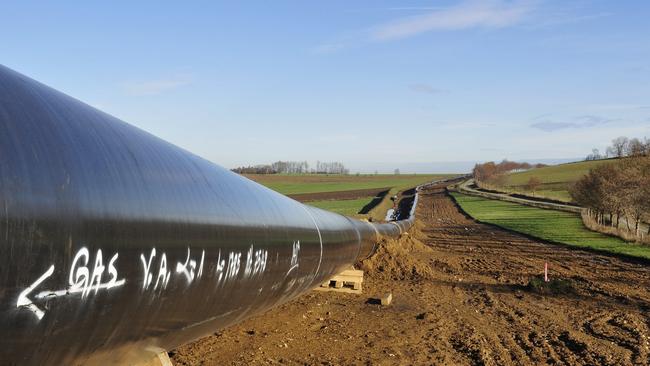APA Group warning over pipeline regulation review
APA Group has warned a review into the regulation of critical gas pipelines on the east coast threatens to delay much needed investment amid looming shortages.

APA Group has warned a review into the regulation of Australia’s gas pipelines threatens to delay much needed investment to boost capacity ahead of looming gas shortages on Australia’s east coast.
The industry was informed on Wednesday that the Australian Energy Regulator, under new powers over the regulation of Australia’s gas pipelines, would initiate the first in a series of reviews, starting with APA’s South West Queensland Pipeline (SWQP).
The pipeline, which links Wallumbilla in South East Queensland to Moomba in South Australia, is a key pipeline in the transmission network connecting Queensland with the southern states.
It is currently subject to light regulation, with an arbitration process in place to handle customer complaints, but the AER is considering whether to convert it to a “scheme pipeline”, which would subject it to full price regulation.
The AER on Wednesday said the SWQP was chosen as the first pipeline for review “due to its importance to the east coast gas system in transporting gas between northern and southern states”.
Speaking to The Australian after delivering the company’s half-year results on Thursday, APA Group chief executive Adam Watson criticised the “bizarre” timing of the review.
“They’ve actually called out the reason why they’re starting there is because of the significance of it in moving gas down, which is sort of bizarre and ironic that you’ve got a gas pipeline that is so critical to energy security, and pricing that’s functioning well,” he said. “We’ve never had a single customer complaint, it’s already lightly regulated so we’ve got full transparency of pricing and everything, and yet the government is giving the regulator power to look at that to see whether or not it should be heavily regulated.
“It is quite concerning that at a time where we need more flexibility in our energy supply, we need to be more nimble ... that they’re putting up barriers making it even harder for us to bring this transition to life.”
The AER was given the responsibility for determining the form of regulation of Australia’s gas pipelines last March as part of new National Gas Law rules introduced by the federal government at the time.
The review of the SWQP will be the first in a series of reviews the AER is planning to undertake over several years.
However with Australia facing a looming material shortfall of gas on Australia’s east coast from 2028, Mr Watson said the reviews undermined the need for further investment in new supplies and infrastructure.
“We’ve put about $700m of expansion capacity in that network at our own risk, ahead of market, to support energy security,” he said.
“If you go to a heavy form of regulation, that form of regulation is going to cause all sorts of problems in our energy transition.
“If we need to do an expansion, all of the decisions around that would be effectively determined by the regulator, and the regulatory processes are slow - it could take two, three, four, five years for them to determine whether or not we should bring an asset to market, by which time the problem’s already hit you in the face.
“You feel like the goal posts are being moved on you in the middle of a pretty important game, and we’ve got to be careful that we don’t have the umpires being the only ones left on the field trying to run the energy transition.”
APA’s underlying EBITDA grew by 5.8 per cent to $930m in the six months to December, underpinned by inflation-linked tariff increases, which resulted in a 3.4 per cent increase in revenue (excluding pass through revenue).
Recent acquisitions including the Basslink interconnector between Victoria and Tasmania, and the Pilbara Energy portfolio of renewable energy assets, lifted the result, and supports the company’s new full-year guidance for underlying EBITDA of $1.87bn to $1.91bn.
Statutory net profit after tax in the first half came in at $1.05bn.
The company reaffirmed full-year distribution guidance of 56c after declaring a 26.5c distribution for the first half.
Mr Watson described it a “solid” result, with the two recent acquisitions “in line with expectations and business cases”.
However he renewed concerns about the policy uncertainty surrounding the role of gas in the country’s energy transition, using last week’s blackouts in Victoria as an example of the important role gas will continue to play.
“Gas fired generation came on to save the day,” he said.
“We lost power to about half a million homes. By our high level estimates, we think that would have been more than a million homes without power if we didn’t have gas.
“We need to be able to bring more gas to market ... but the challenge we’ve got is when you look at things like excluding gas generation from capacity investment schemes, project approval processes, regulation.”
APA shares were trading 0.4 per cent higher on Thursday at $8.20.





To join the conversation, please log in. Don't have an account? Register
Join the conversation, you are commenting as Logout